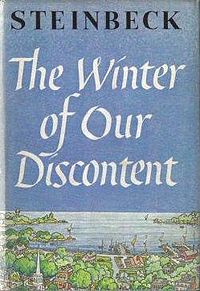Steinbeck, John. (1961). The Winter of our Discontent. New York: Penguin.
In this 1961 novel, main character Ethan is a middle-aged grocery clerk in a small New England coastal town. He used to own the store he works in but he went bankrupt and now works for an Italian immigrant boss. Ethan’s family was once prominent in the town but the family lost its place. Still, Ethan accepts his history and is content, happy with his loving wife and two children, unambitious, and good-humored. He talks, sings, and quotes poetry to the canned goods in the store. Is he really content, or covering up seething rage?
His wife and kids are unhappy living on a grocery clerk’s salary, especially knowing the family was once prominent. They urge Ethan to do something. One day, for no reason, in a bizarre, unmotivated and unjustified reversal of character, he decides to rob the bank. He makes a plan and rehearses it.
Meanwhile, town council members use their political power to benefit their personal business interests. The whole town is rotten, but apparently that’s how things have always been done. The banker urges Ethan to become a player by investing his wife’s nest egg in a new airport the council has voted on, if only they can acquire the perfect property for it, property owned by Ethan’s lifelong friend Danny, who became a drunk after the war.
Ethan offers Danny a thousand dollars for the land; Danny uses the money to drink himself to death as Ethan knew he would; Ethan becomes a major player in town and does not have to rob the bank after all.
Ethan’s financial problems are solved and his family is restored to aristocratic status, but he he worries about the ethics of how he got there. He took advantage of Danny’s weakness; He decided to rob a bank; He took kickbacks from a grocery supplier; He anonymously turned in his boss to the Immigration Service; He took advantage of city council insider information. Ethan ruminates about whether he sold his soul to become member of the elite. Or did he behave like any normal, ambitious American who is determined to change his fate?
Ethan’s ethical breast-beating seems overwrought today, although it stands in contrast to the blasé attitude of entitlement among the monied class, blind to their disrespect of the ordinary people they exploit to sustain a higher status. Ethan is not blind to that human failing, and in the end, his self-awareness prevents him from interpreting his financial success as personal and class entitlement. In that sense he provides a morality lesson as relevant today as it was a half-century ago (and just as inert, I suspect).
As a morality tale, I think the novel is successful, if obvious. Characters and settings are stereotypical, Ethan’s motivation is murky at best, and his personality unlikeable. The writing is light and frothy, a pleasant diversion, with excellent observations of small town life, and of course, it is Steinbeck. You could do worse.

